Tag: electrician training
Industry Trends to Watch for After Electrician Training
May 17, 2022
Trends are always changing for industries as they adopt new technology and sustainability initiatives. This is especially true for the electrical industry, which seems to be moving at a tremendous pace towards a bright future. For an aspiring electrician who’s pursuing a career in the electrical industry, it’s important to be aware of the new trends that are shaping the industry today. The electrical industry is making strides in innovative solutions that will make your career that much more exciting.
At NATS, you’ll get hands-on training through our Construction and Maintenance Electrician program. You’ll learn wiring, service installation, code interpretation, conduit bending, and more for residential, commercial and industrial electricity, as you prepare yourself for upcoming trends in the industry. So, read on to learn more about some of the top industry trends!
Smart Cities Will Be a Big Hit After Your Electrician Training
The electrical industry will see a rising trend in the use and implementation of the smart city framework. A smart city is considered a network made up of information and communication technologies that deliver smart sustainable efforts directed at challenges affecting a growing urban population. A smart city gives the people and their governing bodies the power to make better choices for themselves.
After you complete your electrician training, you’ll be amazed at how a smart city allows people to receive, analyze and oversee data in real-time, which helps them make important decisions that improve their quality of life. Residents of a smart city can monitor their electricity usage and energy consumption through their smartphones and be connected to electrical companies that can also monitor data in real-time. This will help resolve any electrical issues as they occur while improving sustainability and reducing cost.

The Arrival of Augmented Reality to Help With Electrical Work
With the use of augmented reality (AR) being utilized in various industries, it’s about time the electrical industry got on board as well. Augmented reality is becoming a useful technological advancement that’s making its way into the electrical industry, as it helps with electrical projects and tasks. After finishing your training at an electrician school, you may get to wear one of these devices on the job.
Augmented reality can help you plan out an electrical project as you see its conceptual design right in front of you. You can use AR to assist you in planning for electrical wiring at a residential, commercial or industrial building, or to determine how to fix a faulty electrical panel. AR also gives you the flexibility of offering support to fellow electricians or trainees while they’re working on a project, without you having to be present.

Sustainable Materials Are Becoming Major Players in the Industry
With customers becoming more conscious of the environment, it has become imperative for many industries to develop innovative solutions that will allow them to offer sustainable and eco-friendly products and services to customers. The electrical industry is also answering that call.
As an electrician, you’ll probably be making environmentally conscious strides throughout your career as you work on implementing and installing energy-efficient products for different types of buildings or within smart cities. Electrical companies are also shifting their focus toward sustainable operations and offering transparency within their business practices, as they meet consumer demands for energy-saving initiatives.
Interested in an electrician college?
Contact NATS for more information on our training programs!
Common Conduit Bending Mistakes to Avoid After Electrician College
February 01, 2022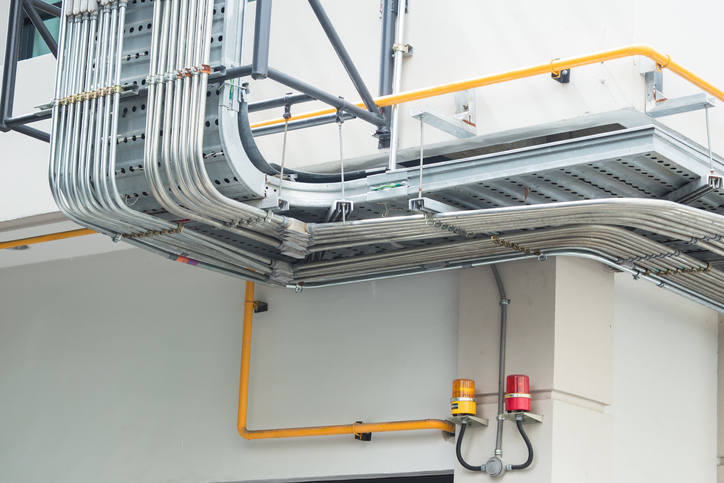
Conduit bending isn’t an easy skill to master when it comes to replacing old electrical wiring or wiring a new home. For electricians, knowing how to correctly and safely bend conduit is a major part of your responsibilities. Knowing how to bend conduit allows you to make it work around different corners, overpass permanent objects and fit many angles. By applying the right amount of pressure and conducting the proper measurements, you can make a good conduit bend.
Avoiding common conduit bending mistakes will prevent things from going wrong. Improperly bent conduits will underperform and wear out quickly. At North American Trade Schools, you’ll gain hands-on experience in conduit bending that will help you avoid common conduit bending mistakes.
Read on to learn about the common conduit bending mistakes to prepare for your trade.
Apply the Right Pressure After Electrician Training
It’s important to have precision and add the right amount of pressure in the right place of the conduit. Applying an excessive amount of pressure won’t help to bend the conduit in the way you want. In fact, too much pressure can break your tools and delay your work even further. When you add more pressure on the bending point than is needed, the conduit can either break or flatten.
Electrician training will help teach you to apply all sorts of conduit bending techniques that are required for installation and prepare you for industry work in your apprenticeship and beyond.
Avoid Using the Wrong Machine or Tool
Knowing when to use and not to use machines to do the conduit bending for you will help you a lot with your electrical wiring and avoid any delays. There are computer numerically controlled (CNC) machine benders that are considered versatile and powerful and offer great precision in conduit bending. However, they should not be used for every conduit shape or simple bends–only for the complex shapes or bends that you can’t perform manually. Through your electrician school, you’ll know when to use or not to use these machines, and how to perform manual conduit bends. When you use manually controlled machines, you will notice that you will increase your output speed and save money.

Avoid Flattening Too Much
With training and experience throughout your career, you’ll avoid the mistake of flattening the conduit too much. In some instances, flattening is okay for certain job requirements–while for other jobs, too much flattening will cause serious problems when it is time for you to do conduit bending. Applying the right pressure and stress to the outside radius is key in the conduit bending process. If you apply too much pressure and stress to the outside radius, the conduit will not be able to maintain its proper shape–causing the exterior to bend in, and therefore, flatten the tube. By using less pressure and utilizing the centreline radius which provides a larger bend, you will reduce the chance of excessive flattening.
Avoid Wrinkling and Buckling
As mentioned earlier, conduit bending requires precision with the amount of pressure applied. Avoid any wrinkling or buckling from occurring by ensuring a smooth bend in the conduit. If you notice any wrinkles or buckling, the bend could cause problems down the line.

This wrinkling and buckling occurs when the cross-section of your bend is unable to support the pressure applied. This happens by using excessive pressure far from the die or by not using a mandrel tool when you should.
Interested in enrolling in electrician college?
Contact NATS for more information!
Keywords: electrician college, electrician school, electrician training
Why to Consider Becoming an Electrical Service Technician After Electrician College
December 14, 2021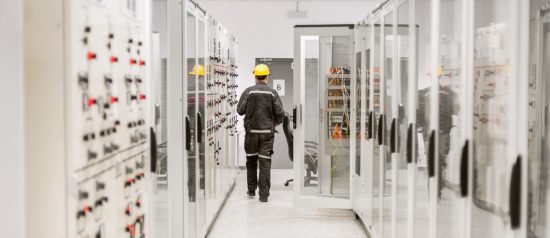
If you like working with your hands and have a knack for handling electrical issues, then you should consider becoming an electrical service technician. It is a dynamic career that offers the potential to develop specialized skills that you can apply to many different industries and settings.
At North American Trade Schools, we offer a Construction & Maintenance Electrician Pre-Apprenticeship Diploma program for aspiring technicians looking to explore a skilled trade in a cutting-edge industry. The program will prepare you to become an electrical service technician, as you develop practical skills while studying the theoretical principles of electricity. Read on to find out why you should consider becoming an electrical service technician today.
No Day Is the Same While on the Job
Electrical service technicians will enjoy the challenge of solving a variety of electrical issues across different settings. You’ll be responsible for diagnosing and troubleshooting any electrical problems relating to commercial, residential, and industrial equipment. In the process, you’ll use diagnostic tools (such as multimeters and signal generators), refer to schematics and wiring diagrams, and repair loose or damaged electrical wiring. As you apply your skills to different projects, your duties can take you to different settings based on the company and industry you work in. By attending an electrician school, you’ll develop a diverse skillset in residential wiring, service installation, code interpretation, conduit bending, print reading, and the principles of electricity.

Join a Practical Profession After Electrician School
Knowledge and experience go hand in hand at an electrician college, like NATS. Students have access to state-of-the-industry campuses with ample opportunity to gain experience using modern equipment in the electrical industry today.
Through a hands-on learning approach, you’ll be ready to design, develop and test a variety of different electrical components and systems in your career. At the same time, you can apply your practical skills to diagnosing and operating specialized equipment. Throughout your career, you’ll also be expected to interpret electrical blueprints and have the expertise to advise clients on the use and safety of certain equipment. With a practical skillset, you can offer a valuable service to homes and companies across different industries.
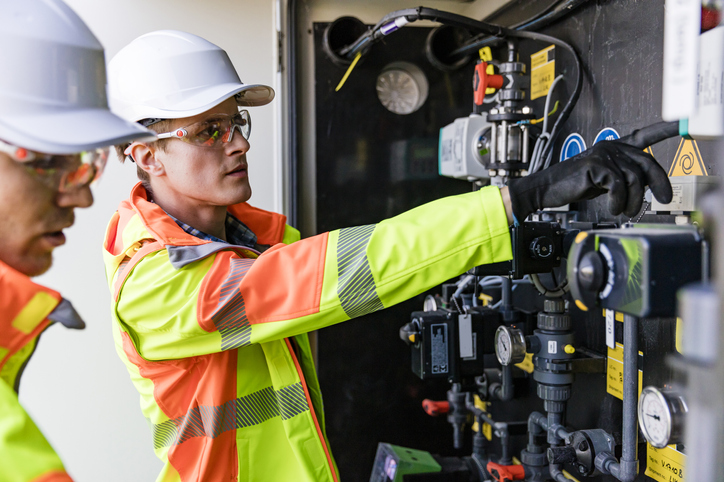
Exciting Potential for Growth
For an aspiring electrical service technician, earning a diploma in the trade is the best way to improve your job prospects in the field. As an electrical service technician, you can specialize in various types of electrical systems across different sectors. Most industries today rely on service technicians to ensure their operations run smoothly and efficiently. These sectors range from media and government to electrical utilities, wholesale trade and computer services. As technology continues to advance in the modern world, we’ll see a growing demand for skilled professionals who can maintain these new systems.
Are you interested in kickstarting your career with electrician training?
Contact NATS to learn more about our program.
3 Specializations to Explore After Completing Your Electrician Training
November 09, 2021
Is a career in the electrical industry right for you? If you’re a great problem solver and are always up for a challenge, a career as an electrician might be right for you. Electricians work either alone or in teams to maintain, install, and repair electrical systems. While all electricians work with these systems, there are actually many different types of electricians within the industry. With the skills they have in wiring, service installation, and more, electricians can specialize in a variety of different electrical work. If you’re considering training to become an electrician, explore the specializations which may be available to you upon getting your certification below.
1. After Electrician Training, You Can Become a Maintenance Electrician
After completing electrician school and getting your certification, one of the career paths you might consider within the electrical industry is that of a maintenance electrician. Maintenance electricians are responsible for the installation and maintenance of the electrical systems which facilitate the operation of factories and plants. These professionals are experts in the electrical aspects of heavy machinery and equipment, large power grids, and general utility electronics.

On a day to day basis, maintenance electricians will make routine inspections of machinery and equipment, and identify any repairs or replacements necessary. They’ll conduct repairs, make sure the electrical systems and components are aligned with provincial and national codes, as well as ensure that everything is functioning to ensure the efficient operation of the plant or factory. If you’re interested in an engaging career path within the electrical industry, becoming a maintenance electrician could be right for you.
2. Consider a Career as a Construction Electrician
If you’re interested in tackling larger projects throughout your career as an electrician, you may want to specialize within the construction industry after your electrician training. Construction electricians work to install electrical systems within newly constructed buildings, or buildings which are undergoing significant renovations. These professionals are experts in building codes and safety procedures–enabling them to safely install wiring and electrical components within a structure. These professionals may work closely with engineers and other professionals working at a construction site. These parties will collaborate in order to ensure that electrical systems are not only installed accurately and efficiently, but also meet the requirements of the projects. Construction electricians may interpret blueprints and architectural drawings, and use their strong communication skills to troubleshoot problems with other professionals on the project.
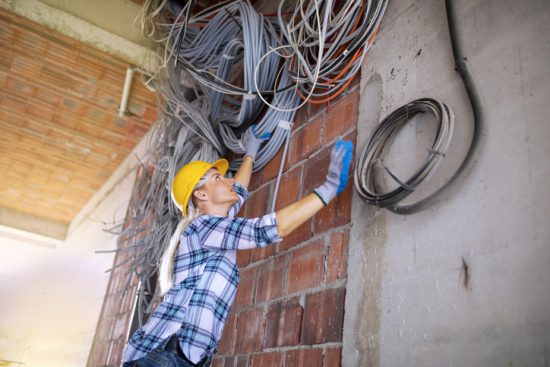
3. Explore a Career as an Electrical Inspector
With construction and maintenance electrician training, you can build the necessary skills and expertise to become an electrical inspector after some years of experience. Electrical inspectors don’t work directly with electrical components and systems. Rather, they conduct examinations within the construction industry–making sure that the systems within new structures are up to code and safety regulations. They may also inspect the electrical systems of older homes if a renovation is being done or the house is up for sale.
With their keen eye and expertise, these professionals will monitor wiring on construction sites, approve new plans for installation, and document their inspections thoroughly. If an electrical inspector notices any mistakes or problems, they have the authority to stop work on a project. If you’re passionate about electrical work but are looking to apply your skills in a manner different from hands-on work, a career as an electrical inspector could be right for you!
Are you ready to enroll in electrician college?
Build the skills you need for a successful career at the North American Trade Schools.
How to Craft a Great Resume After Completing Electrician Training
October 12, 2021
If you’re about to complete your electrician training, you’re probably gearing up to apply for jobs in the electrician industry. While the job application process can seem intimidating, once you know how to put together a great resume, you’ll be able to succeed in launching a rewarding career. During your training, you’ll have built the skills and gained the qualifications necessary to perform a variety of tasks as a construction and maintenance electrician. Not only should your resume reflect that you have what it takes to be an asset to any organization within the industry, but it should help you to stand out amongst other candidates and catch the attention of potential employers. Below, discover a few tips that will help you to create a strong, industry-aligned resume as a future electrician.
After Electrician Training, Don’t Forget to Format Your Resume Correctly
When putting together your resume, one of the biggest mistakes you can make is to neglect to format your resume correctly. When searching for the right candidate, employers may look over hundreds of resumes in a short span of time. Thus, your resume should be formatted in a way that makes it easy for a potential employer to read. When formatting your resume after electrician training, make sure to include a header that includes your name and contact information, followed by clearly labeled sections. Within each section, there should be clear spacing between separate items, and bullet points should be used when listing details such as skills or descriptions of activities and experience.

Include a Summary of Your Qualifications
The goal of your resume is to catch the attention of potential employers, and there’s no better way to do this than with a brief summary of your skills and qualifications at the top of the page. Including a summary of your qualifications gives a potential employer an idea of who you are as a candidate, and lets them know why you’re qualified for the position you’re seeking. Depending on the job description, you can tailor your summary to highlight what makes you a good fit for the particular position.
Detail the Skills You’ve Gained in Electrician Training
Within your resume, you’ll also want to include a list of the skills you’ve built in electrician training. Including a list of skills will help employers to identify why you’re qualified for a particular position, and verify that you’re well-trained as a future electrician. It is important to make sure your details are results-oriented–to show what kind of skills you can offer. Skills to consider putting on your resume might include residential wiring, code interpretation, print reading, conduit bending, service installation, machine control repair, and more.

Tailor Your Resume to the Job Listing
After completing your training at electrician college, it can be tempting to send the same resume to each position you apply to. After all, the job application process can be plenty of work. However, it’s crucial to tailor your resume to the specific job you’re applying for. You’ll want to make sure that the skills and qualifications you’re including in your resume are those which align with what the employer is seeking. Using keywords listed in the job posting can help you make your resume more specific to the position you’re applying to. Tailoring your resume will help employers to recognize how your specific skills and qualifications make you a great fit for the job at hand, increasing your chances of success in the process.
Are you ready to enroll in electrician school?
Launch your career with a program at the North American Trade Schools today!
The Principles of Electricity Explained for Electrician College Students
August 27, 2021
If you’re considering launching your career as an electrician, you’ll use your knowledge of the principles of electricity to accurately install and repair electrical systems–as well as diagnose and troubleshoot electrical problems. Construction and Maintenance Electricians are equipped with the skills to perform a variety of different functions. Some may include: service installation, conduit bending, code interpretation, print reading, machine and electronic control repair, and more. As a Construction and Maintenance Electrician, understanding the principles of electricity will be important to your success. It will help to determine how the electrical systems you’re working with operate, and what the best solution is to any problems that may arise. Below, discover an introductory guide to the principles of electricity.
Where Does Electricity Come From? A Guide for Students in Electrician Training
Essentially, electricity is a secondary source of energy that’s created from the conversion of other sources of energy. Electricity is made up of atoms, which contain a nucleus composed of protons and neutrons. Around the nucleus are electrons, which revolve around the nucleus due to their attraction to protons and electrons. These respective particles contain an electrical charge, as protons are positively charged and electrons are negatively charged. Orbiting electrons that don’t have a strong attraction to the protons in one atom will be pushed out of the rotation and into another atom’s orbit. Electricity is the result of this shifting pattern. After completing your electrician training, you’ll be using this knowledge of electricity to inform the work that you do on the electrical systems within residential and commercial buildings.
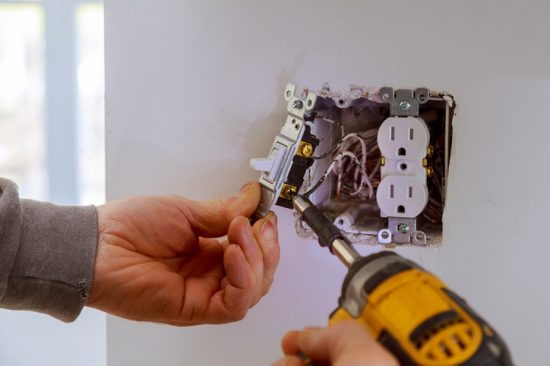
The Electricity Generation Process
The electricity that’s used in residences and other buildings can be created in many ways, but some of the most common sources of electricity generation are coal, wind, and nuclear energy. Coal is burned at an extremely high generator, creating steam which passes through a turbine. The turbines are equipped with a generator–containing coils that rotate within a magnetic field to create electricity. Wind energy is created when wind turns the blades of wind turbines, spinning a shaft connected to a generator which creates electricity. Nuclear energy is produced within power plants, where an atom is split through the process of nuclear fission to create energy. This energy is used to produce heat, and the steam created by this heat generates electricity.
After this electricity is generated, it’s then delivered to consumers via different power lines that make up an electricity grid. Electricity grids connect electricity producers to consumers using substations, transformers, and power lines. As a graduate of electrician college, you’ll be working with the electricity delivered to these residences and commercial buildings.

Terms to Know Surrounding the Principles of Electricity
When learning about the principles of electricity, learning a few basic terms will enhance your understanding of how electricity works.
- Coulomb: A coulomb is a unit of electric charge
- Ampere (Current): Flow rate of an electric current
- Ohm: The unit of resistance within a conductor, determined by temperature, material and size.
- Resistance: Measured in Ohms is the electromotive force needed to pull electrons away from protons within an atom.
- Volt: Measure of the amount of electromotive force needed to push one ampere through a conductor.
- Ohm’s Law: Used to explain the relationship between current, resistance, and voltage. According to Ohm’s Law, the current is equal to the voltage divided by the number of Ohms.
- Watts: A unit of electrical power, equal to the number of volts multiplied by the current.
- Ampacity: The maximum amount of current that a conductor can handle.
Once you master an understanding of the terms used to measure electrical currents and charges, you’ll be able to use this knowledge to install, repair, and maintain electrical systems.
Ready to enroll in electrician school?
Explore your options with a program at the North American Trade Schools today!
Considering Electrician Training? 5 Benefits of Being Your Own Boss
June 08, 2021
After completing their training and gaining a few years of experience, many electricians choose to open their own business. While starting your own business comes with its own set of challenges and hard work, there’s a reason that so many electricians choose to take on this endeavour. Opening your own electrician business can be extremely rewarding, and nothing beats being your own boss.
If you’re considering whether it’s worth it to start your own electrician business, read on to discover five benefits of this exciting venture.
1. If You Start Your Own Business After Electrician School, You’ll Have More Independence
While working for another contractor can offer stability, owning your own electrician business offers an appealing level of freedom. You can choose what jobs you take, and you’ll be in charge of making your own decisions about a project based on your personal assessment. When you open your own business after electrician training, you’ll also be able to decide which services to specialize in. Not only does this level of independence offer you more freedom throughout your career, it also allows you to define your approach to business on your own terms.

2. When You’re Your Own Boss, You Have More Flexibility
It’s often difficult to find a work-life balance throughout your career. For many electricians employed by a company, their schedule is dictated by the demands of their superiors, giving them less flexibility in their day-to-day lives. Opening your own electrician business allows you to make your own schedule, giving you the opportunity to take time off when you need it and leading to more flexibility. Only want to work four days a week? Starting your own electrician business gives you the option to structure a schedule that allows for it.
3. You’ll Potentially Have the Opportunity to Earn More
While most electricians can’t complain about their salary, there are limits to what an electrician can make by doing contracted work. If you decide to start your own business after electrician school, you’ll be able to enhance your own success by setting your own prices. As your business grows, you’ll see the financial rewards increase too.

4. You Have the Freedom to Innovate
After gaining some experience as an electrician, it’s likely that you’ll notice a few processes and procedures which could be improved upon. Although you might not have the opportunity to make beneficial changes to a company’s policies while doing contracted work, opening your own electrician business allows you the freedom to innovate. You can set your business’ goals, develop your own working standards, and create a system that suits you and your clients’ needs.
5. You’ll Be Directly Impacting People’s Lives with Your Business
Everyone requires the services of an electrician at some point in time. There’s nothing better than the feeling of a job well done, and the look on your clients’ faces when they see the results of the work you’ve completed for them. Additionally, you’ll be able to employ other electricians, making a difference in their lives by providing them with a great job.
Ready to enroll in electrician college?
Launch your career with a program at the North American Trade Schools today!
3 Qualities Any Commercial Electrician Should Have After Electrician School
March 16, 2021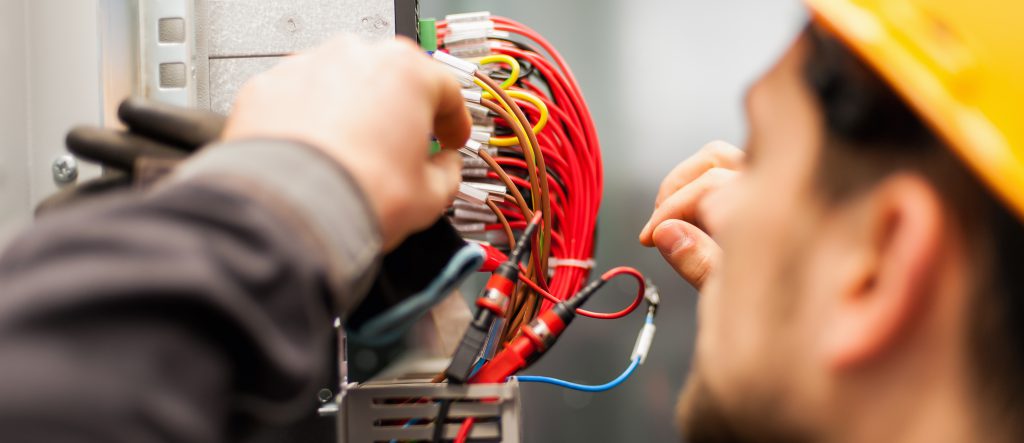
Commercial electricians install electrical systems and wiring within commercial buildings. Their work requires extreme precision and attention to detail–as well as extensive knowledge of electrical systems, codes, electrical standards and guidelines, and more. Commercial electricians often face the complex task of installing and maintaining extensive electrical systems for structures, such as: shopping malls, office complexes, restaurants, and other buildings. These electricians have difficult, and at times, dangerous jobs. Their ability to succeed in their field is made possible through a few key personal qualities.
If you’re interested in a career as a commercial electrician, exploring the qualities below can help you to gain a better grasp of what this profession requires.
1. Problem Solving Capabilities are Important for Those with Commercial Electrician Training
Installing and maintaining the electrical systems and components of a commercial complex can be a complicated task. During a typical job, commercial electricians will have a diverse range of responsibilities. Commercial complexes often have a greater need for efficient electrical systems due to the fact that businesses often use more electricity for communication and general operation. For commercial electricians, navigating the installation of these complex systems requires the ability to problem solve.

Commercial electricians will encounter unexpected challenges on-site, and must be able to come up with creative solutions to problems. Whether it’s determining how to install the number of outlets necessary to meet a business’s needs, or mapping out convenient placement of electrical wiring, professionals with commercial electrician training benefit from being great problem solvers.
2. Electrical Experience and Expertise
Typically, the electrical requirements of commercial complexes are much more demanding and extensive than those of residential buildings. These buildings are larger, consume more electricity, and have greater servicing needs than other structures. Thus, the electricians who perform installations and maintenance for commercial complexes must possess the electrical knowledge and expertise necessary to safely and efficiently meet a project’s needs.
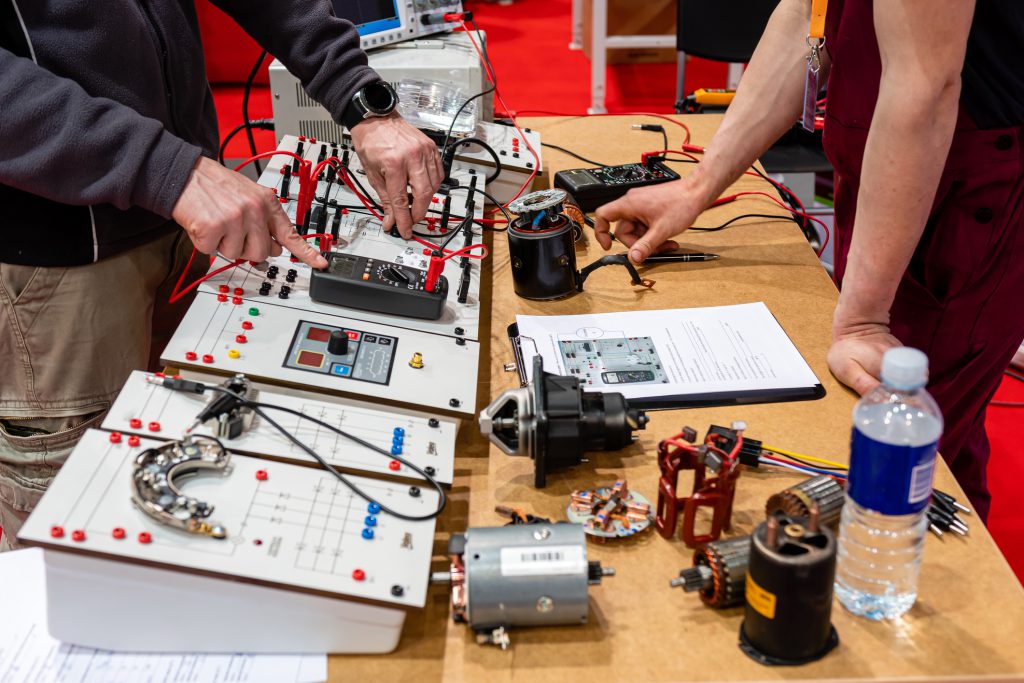
At the North American Trade Schools, electrician college students have access to hands-on training in the lab, which equips them with valuable knowledge and experience in a variety of electrical topics. Their training qualifies them to move on to an apprenticeship, where they continue to build skills through experiential experience. When their training is complete, students will be equipped with the practical knowledge necessary to prepare them for a successful career as a commercial electrician, where they can apply their skills in the field.
3. Commercial Electricians are Dependable
Electricians in all industries have a large amount of responsibility. They are the ones relied upon to plan for and install electrical systems, conduct inspections, and determine the cause of breakdowns or other electrical issues. Businesses and contractors rely on commercial electricians to get the job done right–as a mistake could enhance the risk of electrocution or even fire.
The extent of a commercial electrician’s responsibilities requires that these professionals are extremely dependable. Commercial electricians must be responsive to the needs of the team they are working with, making themselves available to fix problems when they arise. Dependable commercial electricians are better informed about what’s happening on site, and their dedication is reflected in the quality of their work and the efficiency of a structure’s electrical systems.
Are you interested in attending electrician school?
Explore programs with the North American Trade Schools today.
If You’re Considering Electrician Training, Here’s How Moisture Can Affect Residential Wiring
February 23, 2021 Water damage is a common occurrence in residential buildings. In addition to being an inconvenience, water damage can also be a serious safety hazard. When combined, water and electricity can be an extremely dangerous pair — sometimes even deadly. There are many different kinds of moisture that can cause damage to the residential wiring systems in a home or business, with varying degrees of severity depending on the form of moisture and the method of intrusion.
Water damage is a common occurrence in residential buildings. In addition to being an inconvenience, water damage can also be a serious safety hazard. When combined, water and electricity can be an extremely dangerous pair — sometimes even deadly. There are many different kinds of moisture that can cause damage to the residential wiring systems in a home or business, with varying degrees of severity depending on the form of moisture and the method of intrusion.
If you’re thinking about becoming an electrician, it’s important to be able to recognize the signs of moisture damage in order to address potential threats to the safety of a building’s inhabitants and the integrity of its wiring system. Here’s what future electricians should know about the effects of water damage on residential wiring systems.
A Look at Wiring’s Ability to Withstand Moisture for Those with Electrician Training
Most residences contain cables and wiring with different levels of insulation, depending on where they are located. Water exposure can have a varied effect on electrical wiring systems depending on their make and insulation type, as well as the amount of exposure. Wiring systems may consist of bare conductors, such as copper grounding wires, or conductors insulated with nonconductive material such as plastic or vinyl.
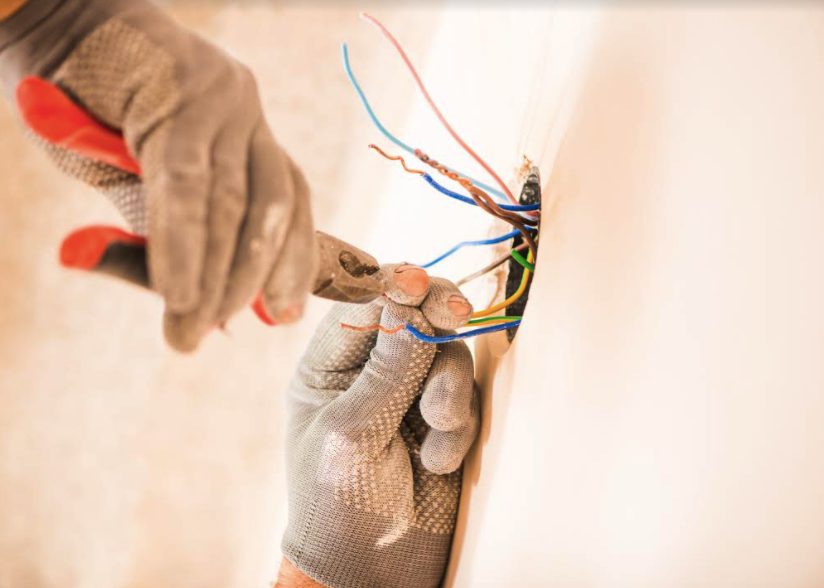
Professionals with electrician training can identify the level of insulation on a conductor by looking at the wire coding. If there’s a “W” in the coding, this means that a wire is suitable to withstand conditions of moisture. Some cables, such as UF-B cables, are manufactured specifically to withstand wet or damp conditions, protecting conductors in water-proof plastic vinyl. However, residences are commonly equipped with plastic-coated Romex cables–consisting of copper ground wire coated with paper and wrapped in neutral and live wires. This wiring is typically unable to withstand exposure to moisture due to its lower level of insulation.
How Moisture Can Harm Residential Wiring
Whenever water penetrates through the walls of a structure, whether in a liquid, frozen, vaporized or condensed form, moisture damage can occur to the residential wiring systems. Within indoor structures, many electrical components are not designed to withstand contact with water, and it’s important that electricians are familiar with elements vulnerable to water damage. Common causes of water damage in residences include burst pipes, leakage and flooding. Excessive moisture resulting from conditions such as a humid environment can also be a catalyst for milder cases of damage.

The most common effects of moisture on wiring include corrosion and mold growth. Over time, corrosion can lead to gradual deterioration of wiring components–leaving systems vulnerable to power loss or further damage. Interior electrical components are typically made more vulnerable to water contact due to the fact that they are often only protected by enamel, which is not effective in preventing water damage. As a result, moisture can cause mountings, conductors, or metal connectors to corrode. Additionally, moisture can increase the current of electrical circuits, leading to overheating and increasing the risk of a fire, or resulting in a blown fuse. When a fuse is blown, short circuiting will occur in the electrical system.
What to Do When Electrical Water Damage Occurs
For those who want to become a construction electrician, it’s important to know what to do in the case of potential water damage to a residential wiring system. If water damage is detected within a structure, it’s important to cut off electrical supply at a residence’s fuse box before inspecting any electrical circuits. Failing to do so could result in shock exposure. In the case of moisture damage, all vulnerable components should be inspected to check for areas of corrosion or mold growth. Depending on the extent of the damage, the affected area can be cut out — but it’s also possible that a new set of wiring will be required. The surrounding area should then be further insulated from moisture to protect against future harm.
In the event of flooding, all cable or wiring products that have been submerged in or exposed to floodwater should be inspected thoroughly to determine whether they can still be used. Floodwater can contain additional contaminants which can be harmful to electrical systems. With this in mind, electricians should be sure to check for foreign elements, as these can interfere with a wiring system’s ability to function.
Ready to enroll in electrician college?
Explore the North American Trade Schools’ program options today.

When smartphones hit the market, everyone seemed to want one. Now more and more people are also upgrading their houses to become smart homes–intrigued by the idea of home automation for an easier and more efficient lifestyle. If you’re interested in electrical wiring, this is a trend you might encounter. These setups can include anything from lighting and temperature automation to security and entertainment systems.
Here’s a quick overview of some key facts about smart home development.
1. Many Start Home Automation With Smart Plugs or Switches
Installing smart plugs or switches is a good way to start the home automation process. Smart plugs allow homeowners to control their smart devices using their phones—or even their voice, if smart speakers are around. Smart switches enable them to control the lighting system much more efficiently. The rise of smart devices makes this an important step, with the wiring process for both switches and plugs being fairly similar.
As an electrician, you’ll first unscrew the wall plate and begin disconnecting wires. It’s a good idea to identify all the wires involved—checking for line and load wires as well as neutral wires. Once everything is properly identified and connected, the homeowner can begin integrating smart applications seamlessly into their home. If you want to become a construction electrician, then you might also be looking to install deep junction boxes (where wires meet) during construction as well as in-wall remote control panels to influence lighting groups for a more complex lighting setup.
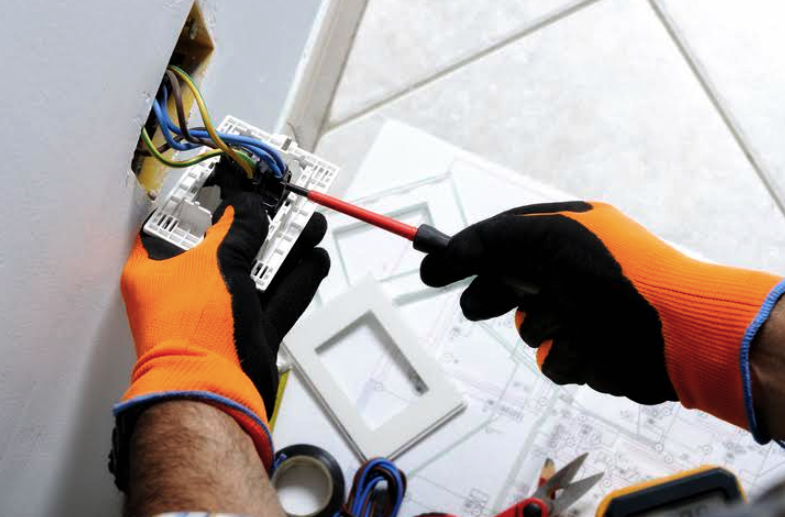
2. Home Temperatures Can Be Automated by Wiring Smart Doors and Windows
In addition to being convenient, automated doors and windows can help manage a home’s temperature during summer and winter. Smart doors can include automated garage and sliding doors–both of which can be programmed to open at a scheduled time. They can also be wired with extra sensors that indicate security risks (such as unlocked or open doors).
Smart windows can operate in the same way. They can be programmed to open or close depending on room temperature. This can be helpful to homeowners who want easier temperature regulation. As a construction electrician, you might also be interested in wiring a smart thermostat, which should be done carefully as it affects the HVAC system. Smart thermostats can give useful energy reports and control temperatures in different rooms. They also provide other features that could make smart homes a compelling option for homeowners.
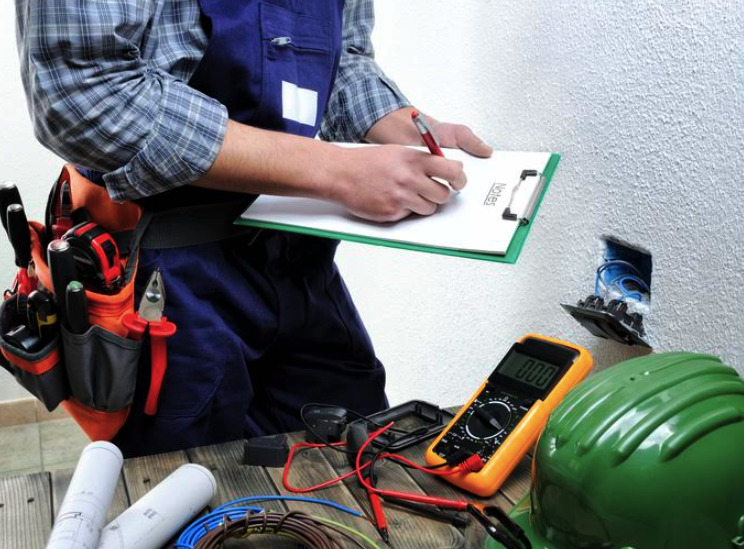
3. Those With Electrician Training Can Help Homeowners Set Up Smart Security
Home alarm systems are a big part of smart home security. Both wired and wireless systems can be used to monitor homes, detect intrusions, and even send notifications directly to an individual’s phone. Wired home security systems are permanent, while wireless systems offer more flexibility and can be easily moved around. This makes the option convenient for homeowners who frequently modify their living space. After your electrician training, you can install home security systems–linking them to motion detectors and security cameras. A wireless setup can be easily hooked into the Wi-Fi network, but wired home security requires a central control panel and some hands-on electrical wiring skills.
The opportunities for smart home development are endless, with options to add smart smoke detectors, video doorbells, and much more.
Do you want to have an electrician career in construction?
Contact NATS for more information!





